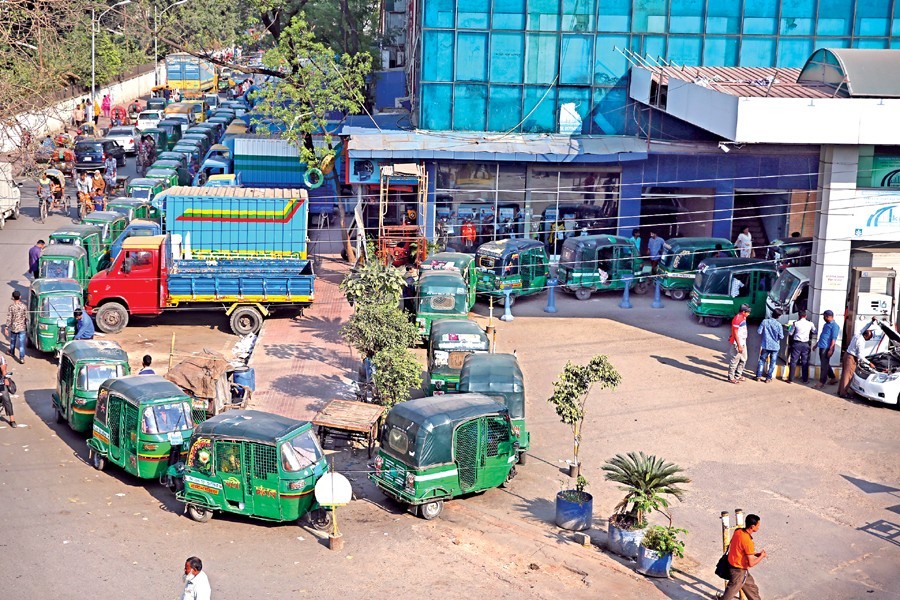Daily life becomes a misery in many parts of the capital for severe fall in pressure of the piped gas supply to households, city-dwellers lament, as they count an extra cost of living.
Officials in the marketing agencies show different causes, but an energy expert also smells a ploy to jack up natural-gas price and then introduce costly LNG in the captive fuel market.
According to them, disruption to supply of the key fossil energy is not only hampering regular activities like cooking breakfast and lunch but also enhancing the cost of living of the residents on account of alternative arrangements.
Besides, queues of automobiles before the CNG filling stations have grown bigger over the last few days as production in gas-based industries is suffering most.
All types of consumers say the gas pressure goes down beyond the usage level from around 7:30am to almost 6:00pm.
In many areas, the situation turned too bad for them to light up the gas-fired ovens throughout the day, forcing people there to change and limit their sleeping habit to prepare food in the early hours.
Like the households, many restaurants and hotels are also seen using cylinder gas as an alternative to keep their business on. The alternative arrangements cost the customers extras.
Simultaneously, low pressure of gas was reported at many CNG (Compressed National Gas) stations in the capital.
Officials, however, admitted to the disruption to the supply of gas, saying that less-than-expected level of supply resulted in the situation.
But sufferers came down heavily on the distributor, alleging that low pressure of gas has been a common phenomenon in the city over the last several months the authorities remaining heedless to the nagging problem facing civic life.
Shafiul Alam, an employee of a private business entity who lives in Chairman Goli (lane) in Dhanmondi's Shankar area, wakes up early in the morning to avert such pains.
"I have to make breakfast for my family members because of my pregnant wife. It forced me to change my sleeping habit from 7 hours to 5 hours," says Alam.
His elder brother with his family came to visit him the day before yesterday (Wednesday) but he failed to cook foods for not getting gas. "So, I had to order foods from a restaurant."
Tania Hossain, a housewife at Rampura, told the FE that the gas normally goes away from the line at 7:00am and resumes at 6:00pm but the pressure is too low.
"So, I have to wait till 7:00pm to get minimum pressure for cocking," she said.
Shamsul Alamin, who works at Café de Taj restaurant in Moghbazar area, said they have used cylinder gas for the last several weeks to cope with the problem of gas unavailability.
He said they raised price of the menu available there a little bit.
Raja Mia, a CNG-driver, said they had to wait comparatively longer to get the gas. In many cases, they did not get enough level of the gas.
National demand for natural gas is said to be more than 3,700 million cubic feet per day while the state-owned Petrobangla could supply less than 2,700 mmcfd, according to the officials.
When contacted, Director (Operations) of Titas Gas Transmission and Distribution Company Limited HM Ali Ashraf admitted the fact of disruption, saying that they supplied 1,600 mmcfd to 1,700 mmcfd against a demand for over 2,000 mmcfd.
He was, however, optimistic about improvement in the situation. "The problem would be resolved from coming April 26 when the LNG (liquefied natural gas) will start to come," he says.
Seeking anonymity, another Titas official blamed illegal consumption of the fossil fuel alongside the demand-supply mismatch for causing the situation to turn for the worse.
He said many people in the capital consume gas illegally from many "source points", which are yet to be removed.
Talking about the issue, Energy Adviser of the Consumers Association of Bangladesh (CAB) Prof Shamsul Alam said the government kept raising tariffs of gas frequently but failed to ensure its smooth supply, which severely hurts people.
"The consumers are not getting gas even after paying higher tariffs. A vested group is illegally getting the benefits. Titas must stop this (the network of illegal trades)," he added.
He also fears that some groups might be hatching conspiracy to create an artificial crisis for making it costly and force people to use the expensive LNG from the captive market.


